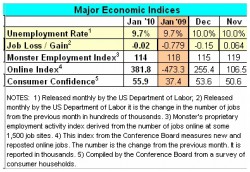 This morning’s monthly jobs report was a mixed bag offering something for both the bears and the bulls.The good news: Unemployment dropped from 10 percent to 9.7 percent. The bad news: The economy continued to lose jobs, shedding 20,000 in January when economists expected jobs to at least be flat, if not grow.
This morning’s monthly jobs report was a mixed bag offering something for both the bears and the bulls.The good news: Unemployment dropped from 10 percent to 9.7 percent. The bad news: The economy continued to lose jobs, shedding 20,000 in January when economists expected jobs to at least be flat, if not grow.
The U.S. Bureau of Labor Statistics also revised its reports for November and December. In November, the BLS now says the economy gained 64,000 jobs, up from its previous estimate of a 4,000 job gain.
That improvement was more than offset by the bureau’s revision to its December number. Instead of the 85,000 job loss it first reported, the BLS now says 150,000 jobs were actually lost.
The report prompted Morgan Stanley’s David Greenlaw to tell Marketwatch, “All in all, we see encouraging signs of progress in labor market conditions and expect to see much better payroll performance in coming months.”
Economists had been expecting a job gain in January, but also a slight worsening of the unemployment rate. A Reuters survey said the average of the economist predictions was for a gain of 5,000 jobs. Marketwatch’s survey put the job growth at 25,000.
The BLS report was complicated by adjustments the bureau made to its data and the introduction of expanded reports, including reports detailing the labor situation of veterans, individuals with disabilities, and the foreign born, and more depth in other areas.
The data revisions adjusted the size of the labor force back to January 2009, which meant that the monthly job changes as first reported were too low. The revisions added 617,000 more lost jobs to the 2009 totals, making the official count for the year a loss of 4.78 million jobs. And the December number is subject to still further revision.
The BLS also reported that the number of unemployed persons by reason of job loss decreased by 378,000 to 9.3 million. Nearly all of this decline occurred among permanent job losers (which, according to the BLS, means “persons whose employment ended involuntarily and who began looking for work”). However, the long-term unemployed (those jobless for 27 weeks and over) was up in January to 6.3 million. Since the start of the recession in December 2007, the number of long-term unemployed has risen by 5.0 million.
Other indices reflected essentially the same yin-yang as the BLS. The Monster Employment Index was down 1 point, while The Conference Board’s count of new, online jobs, showed a gain of 381,800 over December. That’s the biggest jump in new online postings since the Help Wanted OnLine Data Series began in May 2005. But the total number of jobs posted online is still lower than every month in 2008 except for December.
The Consumer Confidence Index also ticked upwards slightly, mostly due to consumers’ more positive outlook for the short term. (The Consumer Confidence Index is a composite of multiple indices derived from a monthly survey conducted by The Conference Board.)
Says Lynn Franco, director of The Conference Board Consumer Research Center, “Consumer Confidence rose for the third consecutive month, primarily the result of an improvement in present-day conditions. Consumers’ short-term outlook, while moderately more positive, does not suggest any significant pickup in activity in the coming months. Regarding their financial situation, while consumers were less dire about their income prospects than in December, the number of pessimists continues to outnumber the optimists.”